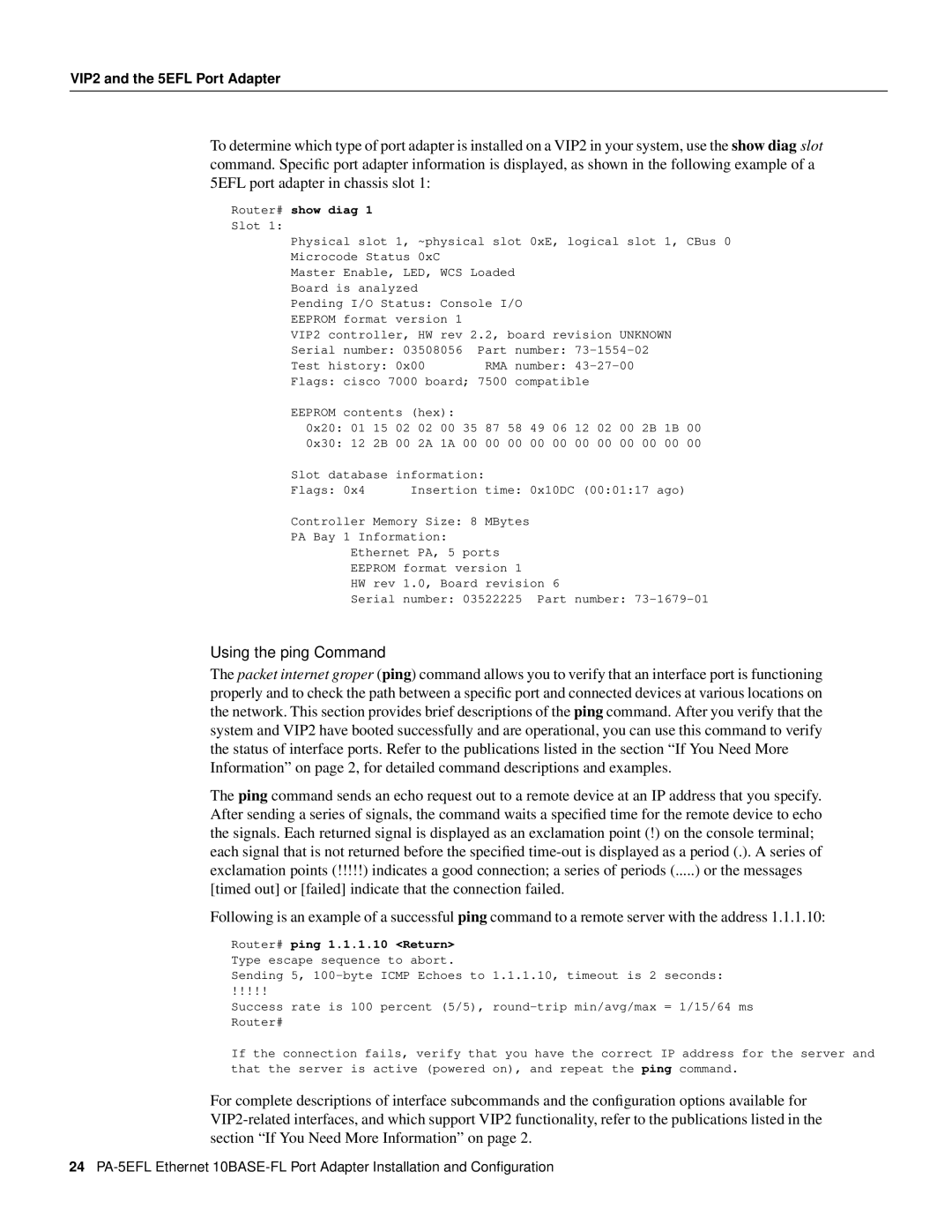VIP2 and the 5EFL Port Adapter
To determine which type of port adapter is installed on a VIP2 in your system, use the show diag slot command. Specific port adapter information is displayed, as shown in the following example of a 5EFL port adapter in chassis slot 1:
Router# show diag 1
Slot 1:
Physical slot | 1, ~physical slot 0xE, logical slot 1, CBus 0 | |||||||||
Microcode Status 0xC |
|
|
|
|
|
|
| |||
Master Enable, LED, WCS Loaded |
|
|
|
|
| |||||
Board is analyzed |
|
|
|
|
|
|
| |||
Pending I/O Status: Console I/O |
|
|
|
|
| |||||
EEPROM format | version 1 |
|
|
|
|
|
| |||
VIP2 controller, HW rev 2.2, board revision UNKNOWN |
| |||||||||
Serial number: 03508056 | Part number: |
|
| |||||||
Test history: | 0x00 |
| RMA number: |
|
|
| ||||
Flags: cisco 7000 board; 7500 compatible |
|
|
| |||||||
EEPROM contents (hex): |
|
|
|
|
|
| ||||
0x20: | 01 | 15 | 02 02 | 00 | 35 87 58 49 | 06 | 12 02 00 | 2B | 1B | 00 |
0x30: | 12 | 2B | 00 2A | 1A | 00 00 00 00 | 00 | 00 00 00 | 00 | 00 | 00 |
Slot database information:
Flags: 0x4 Insertion time: 0x10DC (00:01:17 ago)
Controller Memory Size: 8 MBytes
PA Bay 1 Information:
Ethernet PA, 5 ports
EEPROM format version 1
HW rev 1.0, Board revision 6
Serial number: 03522225 Part number:
Using the ping Command
The packet internet groper (ping) command allows you to verify that an interface port is functioning properly and to check the path between a specific port and connected devices at various locations on the network. This section provides brief descriptions of the ping command. After you verify that the system and VIP2 have booted successfully and are operational, you can use this command to verify the status of interface ports. Refer to the publications listed in the section “If You Need More Information” on page 2, for detailed command descriptions and examples.
The ping command sends an echo request out to a remote device at an IP address that you specify. After sending a series of signals, the command waits a specified time for the remote device to echo the signals. Each returned signal is displayed as an exclamation point (!) on the console terminal; each signal that is not returned before the specified
[timed out] or [failed] indicate that the connection failed.
Following is an example of a successful ping command to a remote server with the address 1.1.1.10:
Router# ping 1.1.1.10 <Return> Type escape sequence to abort.
Sending 5,
!!!!!
Success rate is 100 percent (5/5),
If the connection fails, verify that you have the correct IP address for the server and that the server is active (powered on), and repeat the ping command.
For complete descriptions of interface subcommands and the configuration options available for
24
